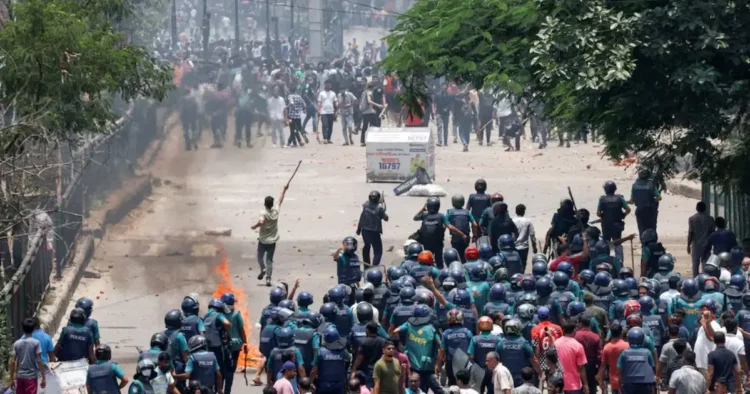On Monday, the Bangladesh government officially confirmed that 150 people were killed across the country during recent student protests over the job quota system. The unrest, which began in universities and colleges, spread rapidly, leading to widespread violence and significant damage to government buildings.
In response to the violence, the government has declared a nationwide day of mourning. Cabinet Secretary Mahbub Hossain announced that people are encouraged to wear black badges and that places of worship, including mosques, temples, and churches, should offer prayers for those who lost their lives and for the wounded.
Home Minister Asaduzzaman Khan Kamal presented a report confirming the death toll and detailed the ongoing situation. Military and paramilitary forces are patrolling Dhaka, the capital, to prevent further unrest. The student protests had initially started over demands for changes in the job quota system but quickly escalated into broader demonstrations against Prime Minister Sheikh Hasina and her government.
The unrest led to clashes between protesters and security forces, resulting in numerous injuries and damage to infrastructure. The violence prompted the government to enforce a strict curfew and call in the army to restore order. The protests were initially sparked by student demands for reform in the job quota system, which had reserved a significant percentage of government jobs for certain groups.
On July 21, the Supreme Court of Bangladesh ordered a reduction in the quota system, reducing reserved posts from 56% to 7%. The government issued a notification in line with this order, opening 93% of jobs to merit-based candidates. While many students accepted this reform, others continued to protest, claiming that their leaders had been coerced into withdrawing the demonstrations under police pressure.
Despite the government’s efforts to quell the protests, some students continued to demand a public apology from the Prime Minister, the dismissal of several ministers, and the reopening of schools and universities, which had been closed due to the unrest. The protests had also caused a nationwide curfew and significant disruptions to daily life and the economy.
The unrest had severe economic repercussions, with estimates suggesting a $10 billion impact on Bangladesh’s economy. The garment industry, a major export sector, alone faced losses of approximately $545,000. The Foreign Investors Chamber of Commerce and Industries (FICCI) highlighted the economic damage caused by the protests.
After a 10-day disconnection of mobile internet and key social media platforms, internet services have been restored. However, many businesses relying on social media platforms like Facebook for commerce have yet to fully resume operations.
The government has accused the Jamaat-e-Islami (JI) party and opposition groups of inciting violence during the protests, attributing the chaos to political motives rather than the students’ original demands. The situation remains tense as the government continues to address the aftermath of the protests and the impact on the nation.

















Comments